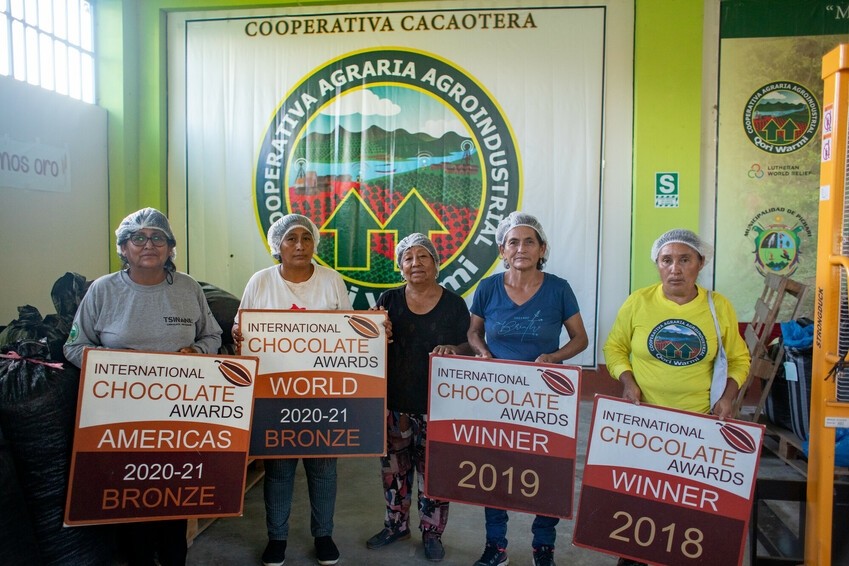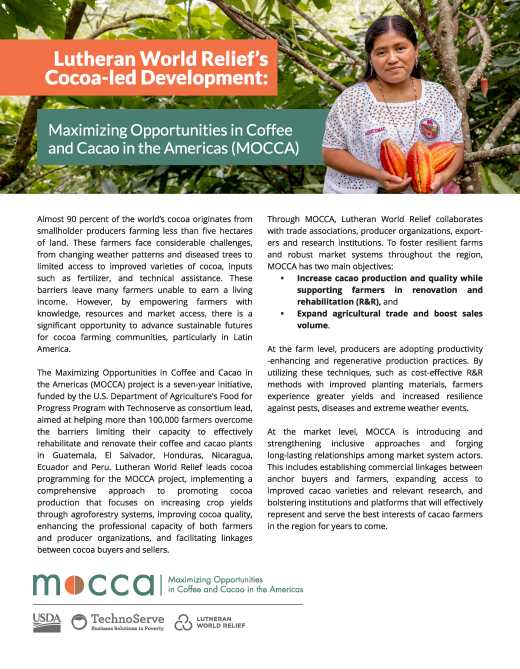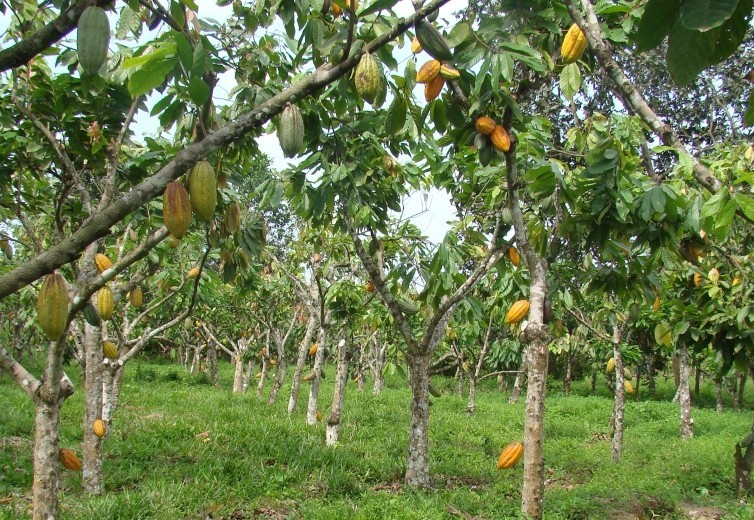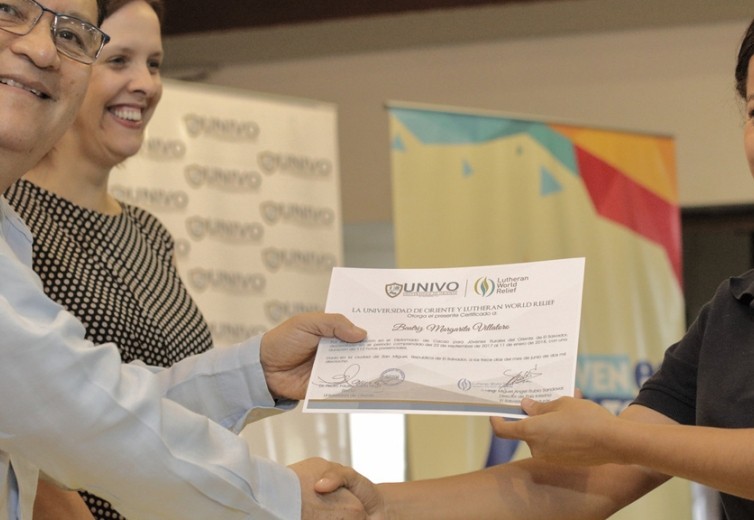Almost 90 percent of the world’s cocoa originates from smallholder producers farming on fewer than five hectares of land. These farmers face considerable challenges, from changing weather patterns and diseased trees to limited access to improved varieties of cocoa, inputs such as fertilizer, and technical assistance. These barriers leave many farmers earning less than one dollar per day. Yet as global demand for cocoa increases, opportunities emerge for smallholder farmers to benefit from higher incomes through improved cocoa production and sustainability in all cocoa-producing areas of Africa, Latin America and Asia.
Resilient agricultural value chains
Lutheran World Relief works to strengthen capacity within and linkages to cocoa supply chains and markets as we promote environmentally responsible cocoa husbandry through technical and extension support. Our focus on agroforestry systems, for example, offers solutions for reforestation, shade management, disease control and adaptation to environmental shocks, all while encouraging farmers to intersperse food crops with cocoa plants for increased food security. Producers reap the benefits of increased yields and healthy soil, trees and biodiversity. LWR helps farmers improve cocoa quality by improving post-harvest processing through enhanced fermentation, drying and infrastructure and by identifying cocoa varieties that are in demand by the market. Our innovative programs utilize information technology to expand our reach and bring new techniques for fermentation and drying as a means of improving smallholder farmers’ lives and reaching economies of scale.
Access to inputs
Access to inputs is critical to producers’ success. LWR supports cocoa farmers by expanding access to affordable inputs through nurseries, cooperatives and associations, where farmers purchase necessary seed and fertilizer at wholesale prices. Cooperatives’ internal credit systems also increase farmers’ production capacity by giving them the capital they need to acquire the assets necessary for production.
Market linkages
We support farmers, especially women and youth, as they engage with international markets, backing their efforts to increase their product differentiation in the marketplace by promoting transparency, quality and traceability. We link producers with branded chocolate makers, such as The Hershey Company and Guittard Chocolate, that provide technical expertise and assistance. We promote strategic alliances with key cocoa industry players, such as Ofi and ECOM, to help grow both cocoa sales and farmer incomes. These efforts demonstrate our commitment to partnering with the private sector while increasing cocoa producers’ capacity to supply a global market and to put food on their own tables.
Williams Isidro Saravia and his wife pack the chocolate tablets they made and sell for $1.25 per package. Williams graduated from Lutheran World Relief’s Diploma in Cocoa Management program for youth in El Salvador.
Preparing the next generation
These measures support cocoa farmers today, but they also solidify an increasingly viable livelihood for the next generation. LWR recognizes agriculture as the engine driving rural economies in many Global South nations and finds in cocoa farming strong potential for youth to break the cycle of poverty and engage in their traditional agricultural livelihoods. LWR creates entry points for youth in the cocoa supply chain by developing their transferable skills as data collectors and service providers. Our programs link youth with the private sector, thereby improving their opportunities to find formalized work. Through our apprenticeship and diploma programs, young people gain certifiable skills in cocoa production and become productive members of the agricultural community.
In practice
With funding from Global Affairs Canada and led by Mennonite Economic Development Associates of Canada (MEDA), Lutheran World Relief implements the Opportunities for Circular and Inclusive Diversification in Agriculture (OCIDA) project in Honduras' Dry Corridor. This five-year initiative supports 7,000 cacao and coffee producers across Copán, Santa Bárbara, Ocotepeque, Lempira, Intibucá, and La Paz by promoting sustainable agricultural practices, resource efficiency, and value-added services. Through technical assistance in agroforestry, post-harvest handling, and quality standards, the project empowers women and youth, enhancing their access to agri-food technologies and services while fostering connections between producers and suppliers via adapted e-platforms.
Funded by the U.S. Department of Agriculture’s Food for Progress Program, TRACE is a five-year project that improves Nigeria’s cocoa productivity through climate smart agriculture and expand its traceability for stronger marketability. In partnership with the federal and state governments of Nigeria, the International Institute of Tropical Agriculture, the Cocoa Research Institute of Nigeria, Ecometrica, and C-Lever.org. Lutheran World Relief implements TRACE in Nigeria's cocoa-producing states of Abia, Ikwa Ibom, Cross Rivers State, Ekiti, Ondo, and Osun. By the end of the project, over 51,000 smallholder farmers will be trained, resulting in a doubling of cocoa productivity and establishing a comprehensive (farm to export) traceability system that meets global standards. More than 68,400 farmers will gain access to markets, and over 366,000 hectares of farmland will be under improved climate risk reduction and/or natural resource management practices.
LWR leads cacao programming for the USDA-funded Maximizing Opportunities in Coffee and Cacao in the Americas (MOCCA) project, helping farmers sell more at better prices, improving farmer production and enhancing sector coordination to drive competitiveness and growth. Through MOCCA, LWR partners with the private sector across six countries in Latin America to not only invest in improving cocoa quality and yields, but also in the systems that make those improvements possible for the future, such as higher prices, good genetic material for planting, and more direct, feasible and profitable supply chains for smallholder farmers. Cocoa producers also utilize LWR’s Cacao Móvil (Mobile Cocoa), a smartphone application that provides farmers with access to a comprehensive guide to cocoa cultivation, covering subjects from planting and pruning, to grafting and treating plant diseases. LWR is developing a regional platform for knowledge transfer to strengthen the cocoa value chain while disseminating research across Latin America.
In the VRAEM region of Peru, one the country’s poorest and the epicenter for coca leaf production for illegal cocaine, LWR employs an innovative market systems approach with the women-led Qori Warmi cocoa cooperative. LWR supports management of the cooperative's cacao crop, including post-harvest handling, fermentation practices and protocols and business management. By strengthening the resilience and sustainability of the cooperative, LWR increases participating families’ agricultural productivity and environmental responsibility, strengthens entrepreneurial capacity and leadership within the cooperative, as well as promotes cacao as a legal and high-value crop alternative to the illicit coca production.
Ground Up Investing (GUI), LWR’s impact investing fund, uses a patient capital approach, that includes equity and debt financing, to grow mission-driven enterprises that deliver positive economic, social and environmental outcomes for smallholder farmers. GUI has invested in several companies in the cocoa and chocolate industry that are introducing innovative business practices to achieve these aims. For instance, Uncommon Cacao, sourcing from countries that include Belize, Colombia, Guatemala, Haiti, Ghana and Uganda, has pioneered industry-leading transparent trade reporting. Additionally, To’ak Chocolate works with cacao growers and conservationists to preserve the Ecuadoran Ancient National cacao and produce some of the world’s most exclusive chocolates. Latitude Chocolate in Uganda has full bean to bar vertical integration at source. These approaches are helping to transform the terms of trade for farmers while supplying sustainable, scalable and environmentally responsible cocoa and chocolate products to highly discerning buyers around the world.
In 2017, Lutheran World Relief launched the Central America Regional Cocoa Flavor Map, an innovative initiative documenting the distinct flavor profiles of cocoa produced by Lutheran World Relief farmer and cooperative partners in El Salvador, Nicaragua, and Honduras. The Cocoa Flavor Map has grown to include Guatemala, Peru and Ecuador and helps cocoa producers better connect with buyers of fine and specialty cocoa, who can quickly identify the sources for the cocoa flavors, profiles and characteristics they are seeking. Farmers and cooperatives can demonstrate an ability to offer customer-driven solutions, as well as to adopt a more knowledgeable post-harvest approach. Chocolate makers are able to obtain exclusivity on special micro-lots, purchase lots that exactly cover their needs, and increase their knowledge, transparency and traceability of cocoa processing. The Cocoa Flavor Map was developed in collaboration with Zoto. Explore the Lutheran World Relief Cocoa Flavor Map at https://cocoaflavormap.cacaomovil.com.
Our Mobile Cocoa (Cacao Móvil) application and Chatbot gives cocoa farmers the technical expertise they need, right at their fingertips. The app is a solution to the geographic isolation that makes it difficult for many farmers in Latin America to learn how to grow quality cocoa. The app’s 10 practical guides include information on cocoa cultivation and covers subjects ranging from soil management, pruning techniques, pest management, and a primer on cocoa marketing. Cacao Movil is freely available through cacaomovil.com or Google Play. The development of Cacao Movil was originally funded by the U.S. Department of State and the World Environment Center’s Pathways Innovation Challenge. Lutheran World Relief was one of four winners among 600 applicants chosen to receive the funding, designated for the most innovative and successful models for strengthening and expanding small-medium enterprises in Latin America.

Women of the Qori Warmi cooperative in Peru gather in the warehouse and show off the awards that their chocolate has won.











